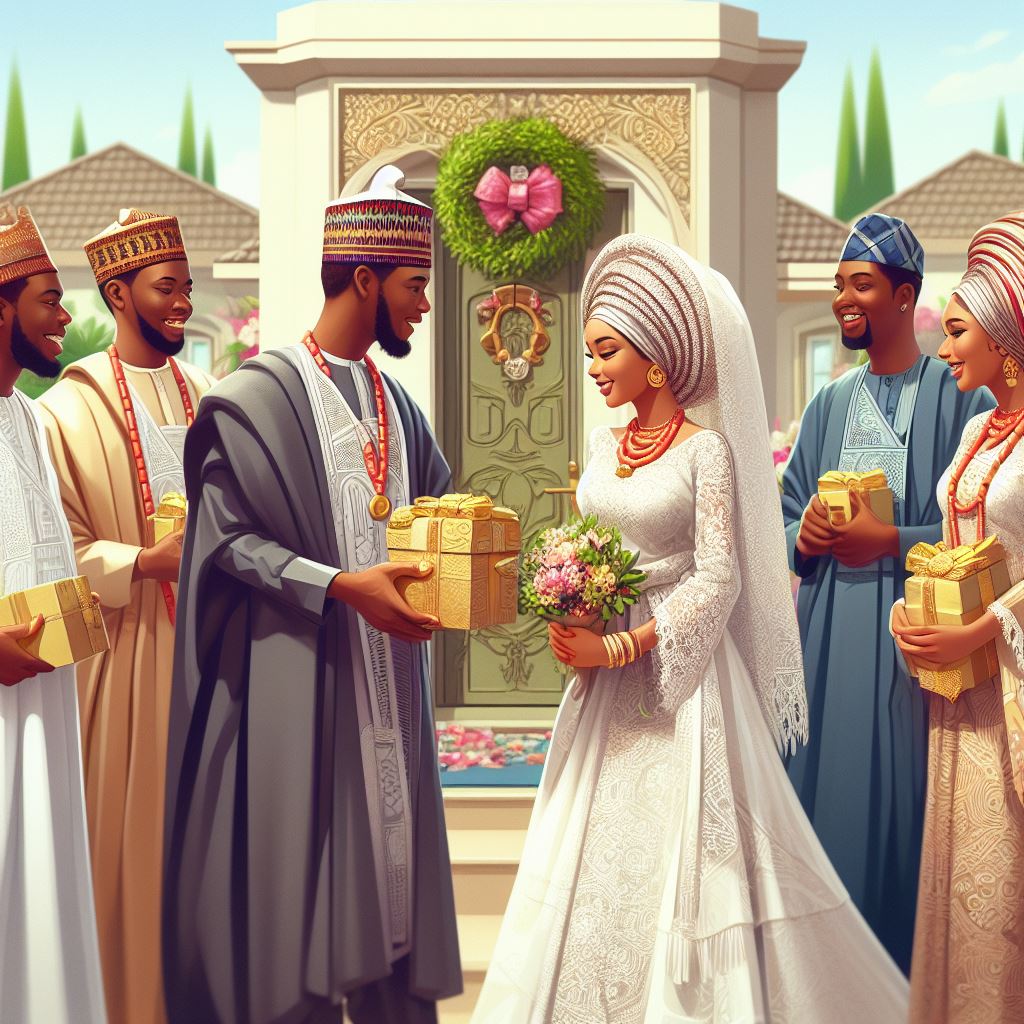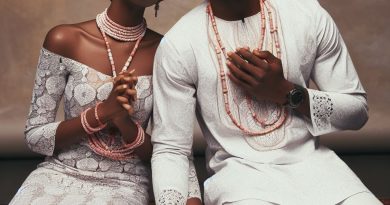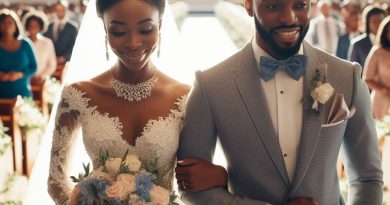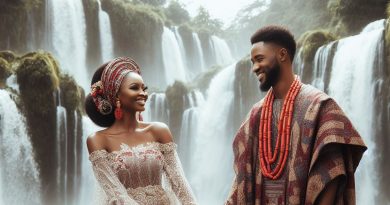Modern Nigerian Couples: New Takes on Age-Old Traditions
Last Updated on January 28, 2024
Introduction
Traditional Nigerian weddings have evolved with the changing times, as modern couples in Nigeria are redefining age-old traditions.
The evolution of age-old traditions in Nigerian marriages
Modern Nigerian couples are reshaping age-old marriage traditions with a fresh perspective. Here’s how:
- Customized Ceremonies: While traditional customs remain central, couples infuse personalized elements to make the day uniquely theirs.
- Changing Roles: Gender roles are evolving as more couples embrace equality in responsibilities and decision-making.
- Technology’s Influence: From online matchmaking to virtual weddings, technology plays a pivotal role in modern Nigerian unions.
- Intertribal Unions: Intertribal marriages are on the rise, fostering unity and diversity within the nation.
Traditional Nigerian Marriages
Marriage is highly valued in Nigerian culture and is seen as a sacred union between two individuals.
The essential elements of traditional Nigerian marriages
Traditional Nigerian marriages have specific elements, customs, and rituals that are followed to celebrate this important milestone.
Customs in traditional ceremonies
- Negotiation and Introduction: Traditional Nigerian marriages often begin with a negotiation process between both families.
This involves the introduction of the intending couple to their families, where the families exchange pleasantries and discuss their backgrounds. - Dowry Payment: One significant element of traditional Nigerian marriages is the payment of the bride price or dowry.
This is a symbolic gesture that showcases the groom’s commitment, respect, and ability to care for his bride. - Traditional Ceremonies: Traditional Nigerian marriages involve various ceremonies that showcase the rich cultural heritage of the country.
These ceremonies differ across ethnic groups but commonly include engagements, traditional wedding ceremonies, and post-wedding rituals. - Engagement Ceremony: The engagement ceremony is a formal announcement and introduction of the intending couple to their families and wider community.
It involves the exchange of gifts, typically including kola nuts, palm wine, and other traditional items. - Traditional Wedding Ceremony: The traditional wedding ceremony is the pinnacle of the marriage celebration.
It is a vibrant and colorful event that showcases the customs and traditions of the couple’s ethnic group.
It includes traditional attires, music, dancing, and feasting. - Traditional Attire: The bride and groom usually wear traditional attire during the wedding ceremony.
This attire varies according to the ethnic group, and it is chosen to symbolize cultural heritage and pride.
Rituals and Symbolism
Traditional Nigerian marriages involve various rituals and symbolic gestures.
These can include pouring of libations, breaking of kola nuts, tying of the marriage knot, and sharing of meals.
Roles and Expectations of Couples
In traditional Nigerian marriages, couples have specific roles and responsibilities.
The husband is seen as the head of the family and is expected to provide for and protect his wife.
The wife, on the other hand, is expected to be submissive and supportive.
In short, traditional Nigerian marriages encompass essential elements, customs, and rituals that are deeply rooted in culture.
They celebrate the union of two individuals while strengthening family ties and communal bonds.
These marriages play a crucial role in preserving cultural heritage and passing it on to future generations.
Read: Duration of Obtaining a Marriage Certificate in Nigeria: What to Expect
Changing Dynamics in Modern Nigerian Marriage
How modern Nigerian couples are redefining age-old traditions
In recent years, modern Nigerian couples have been redefining age-old traditions, embracing new perspectives and values that reflect the changing times.
Influenced by Western culture, Nigerian marriages are undergoing a significant transformation, with an increased emphasis on individual choices and preferences.
The influence of Western culture on Nigerian marriages
- A Shift in Traditions: Traditional Nigerian marriages were characterized by arranged unions, where families played a central role in matchmaking.
However, modern couples are challenging this norm, opting for love marriages based on mutual affection and compatibility. - Influence of Western Culture: The influence of Western culture cannot be ignored in shaping modern Nigerian marriages.
Western ideals, as depicted in movies, television shows, and social media, have influenced Nigerian couples to seek greater autonomy and independence in choosing their life partners. - Education and Career: As more Nigerian women pursue higher education and career advancement, they are becoming economically empowered and seeking partners who respect their aspirations.
This shift has led to a reevaluation of traditional gender roles and a greater emphasis on equality within marriages. - Changing Gender Dynamics: Modern Nigerian couples place a high value on egalitarian relationships, where decision-making is shared, and responsibilities are divided equally.
This contrasts with the traditional patriarchal system where men held dominant roles within the household.
The increasing emphasis on individual choices and preferences
Individualism and Personal Choices
Modern Nigerian couples are championing individual choices and preferences, transforming the landscape of traditional unions.
- Customization: Couples now infuse their wedding ceremonies with unique personal touches, celebrating individuality.
- Partner Selection: The emphasis is on compatibility, irrespective of tribal or ethnic backgrounds, strengthening the foundation of unions.
- Interpersonal Dynamics: Modern spouses actively engage in shared decision-making, promoting equality and mutual respect.
- Career Aspirations: Pursuing individual career goals is paramount, offering self-fulfillment alongside marital happiness.
Therefore, striking a balance between individual autonomy and collective responsibility remains a crucial consideration in fostering a harmonious and inclusive society.
Read: Online vs. Offline: Where to Get Your Nigerian Marriage Certificate
New Takes on Age-Old Traditions
Modern Nigerian couples have found innovative ways to incorporate traditional elements into their weddings while embracing modernity.
By blending the old with the new, they infuse their ceremonies with a unique twist, preserving their cultural heritage.
Examples of unique twists and updates in traditional ceremonies
1. Modern Nigerian Traditional Attire
- Incorporating vibrant colors and intricate designs into traditional outfits, Nigerian couples add a contemporary touch.
- Combining traditional fabrics like Ankara and Aso Oke with modern silhouettes creates a fusion of cultures.
- Brides may opt for a modern white wedding gown for the ceremony and change into a traditional outfit for the reception.
- Grooms now experiment with different styles, such as pairing Agbada with trousers or opting for a fitted Kaftan.
2. Creative Ceremonial Practices
- Modern Nigerian weddings incorporate traditional customs like the Yoruba engagement ceremony, but with unique twists.
- Aisles adorned with rose petals and floral arches are combined with the traditional Yoruba “Oko Iyawo” ceremony.
- Exchanging vows and rings at the traditional Igbo wine-carrying ceremony symbolizes the fusion of modern and traditional.
- The traditional breaking of the kola nut is now done during the reception to involve all guests in the ritual.
3. Bridging the Generation Gap
- Nigerian couples prioritize the preservation of cultural heritage without disregarding the desires and preferences of younger generations.
- They strike a balance between honoring age-old traditions and incorporating modern aspects into every aspect of the wedding.
- By involving parents and elders in the decision-making process, couples ensure that cultural heritage is respected.
- Creating a sense of inclusivity by using social media and technology to share and document the wedding ceremonies.
4. Culinary Innovations
- While traditional Nigerian dishes like Jollof rice and Egusi soup remain staples, couples introduce new culinary trends.
- Modern Nigerian weddings offer fusion menus, incorporating international cuisines that reflect the couple’s diverse backgrounds.
- Dessert tables with decadent cakes, cupcakes, and other sweet treats add a modern twist to the traditional wedding feast.
- Couples also provide options for guests with dietary restrictions, showcasing their attentiveness and adaptability.
5. Music and Dance
- Nigerian weddings are famous for their vibrant music and energetic dance performances.
- Couples continue to embrace traditional genres like Highlife and Juju music but also incorporate modern hits.
- Professional dance choreography blends traditional Nigerian dances with contemporary moves, leaving guests in awe.
- Guests actively participate, creating a lively atmosphere that celebrates both tradition and modernity.
The significance of preserving cultural heritage while embracing modernity
The significance of preserving cultural heritage while embracing modernity
It is evident that modern Nigerian couples are finding innovative ways to celebrate their weddings while honoring their age-old traditions.
Through creative updates in attire, ceremonies, and culinary choices, they successfully merge the past with the present.
By preserving their cultural heritage, these couples create unforgettable weddings that embody both tradition and modernity.
Read: Marriage Certificate and Immigration: What You Need to Know

Uncover the Details: Marriage and Commitment: Biblical Passages Explored
Challenges Faced by Modern Nigerian Couples
Modern Nigerian couples often encounter various challenges when trying to balance tradition and modernity. These challenges are:
- Expectations: Striking a balance between familial expectations and personal desires can be demanding.
- Intertribal Unions: Managing diverse traditions in intertribal marriages requires diplomacy and compromise.
- Gender Roles: Reconciling traditional gender roles with modern notions of equality can lead to conflicts.
- Financial Pressures: Balancing the cost of elaborate ceremonies with financial prudence is a common concern.
Potential conflicts with older generations’ expectations
Modern Nigerian couples often grapple with conflicts arising from the stark differences between their expectations and those of older generations.
- Changing Roles: The evolving roles of men and women in marriages challenge traditional gender norms.
- Intertribal Unions: Marrying outside one’s tribe can trigger generational concerns about cultural preservation.
- Customization vs. Tradition: Older generations might favor strict adherence to traditions, while modern couples seek personalization.
- Technology’s Role: Technology plays a crucial role, creating a divide between tech-savvy younger generations and more traditional elders.
The importance of open communication and understanding within couples
- A Strong Bond: Open communication builds trust and strengthens the emotional connection between partners.
- Resolving Conflicts: Understanding each other’s perspectives is crucial for resolving disagreements amicably and avoiding long-standing disputes.
- Balancing Tradition and Modernity: Couples must openly discuss their views on tradition and modernity to find common ground.
- Decision-Making: Joint decisions about careers, family planning, and finances rely on effective communication and understanding.
These elements underscore the pivotal role of open communication and understanding, creating the foundation for resilient and blissful modern Nigerian marriages.
Read: Bigamy and the Marriage Act: What Every Nigerian Should Know
Benefits and Advantages of Modern Nigerian Marriages
Modern Nigeria marriages have brought about several positive changes and advancements, making them more flexible and inclusive.
Let’s explore the benefits of these modern unions:
- Individual Freedom: Couples have the freedom to make personal choices and pursue individual dreams.
- Equality: Modern marriages promote gender equality, ensuring that both partners share responsibilities and decision-making.
- Cultural Fusion: Intertribal unions foster cultural diversity, enriching the cultural tapestry of Nigeria.
- Economic Prudence: Couples opt for cost-effective ceremonies, reducing financial strain and focusing on long-term stability.
The positive aspects of modern Nigerian marriages
Modern Nigerian marriages offer several noteworthy benefits, shaping a vibrant landscape of contemporary unions:
- Individual Expression: Couples now have the freedom to express their unique personalities and aspirations.
- Equality: Gender roles are evolving, promoting shared responsibilities and balanced decision-making.
- Cultural Diversity: Intertribal unions enrich the nation’s cultural fabric, fostering unity in diversity.
- Financial Prudence: A trend towards more cost-effective ceremonies eases the financial burden on couples.
- Global Exposure: Exposure to international ideas and traditions broadens horizons and enhances cultural adaptability.
How the evolution of traditions allows for greater flexibility and inclusivity
The evolution of traditions in modern Nigerian marriages paves the way for greater flexibility and inclusivity:
- Customization: Couples can personalize their ceremonies, infusing them with unique elements while maintaining core traditions.
- Intertribal Unions: Embracing intertribal marriages fosters unity and diversity, transcending historical boundaries.
- Gender Roles: A shift towards more equal roles empowers couples, promoting shared responsibilities and decision-making.
- Family Acceptance: Evolving traditions encourage families to be more accepting of diverse marital choices.
The empowerment of individuals in making their own decisions regarding marriage
Modern Nigerian couples are rewriting the rules, empowering themselves to make independent decisions about marriage:
- Personal Compatibility: Couples prioritize personal compatibility over traditional factors when selecting partners.
- Intertribal Marriages: The rise of intertribal unions emphasizes the individual’s freedom to choose love over tribal boundaries.
- Gender Equality: A push for gender equality empowers individuals to create partnerships based on shared responsibilities.
- Family Acceptance: Modern couples lead in changing family perceptions and gaining acceptance for diverse marital choices.
Conclusion
In summary, this blog post discussed the new takes on age-old traditions within modern Nigerian couples.
We explored the changes that are taking place in Nigerian marriages, highlighting the importance of embracing change while honoring cultural traditions.
Throughout the post, we saw how these couples are adapting to modern dynamics, such as gender equality, interfaith marriages, and prioritizing emotional connection.
It is crucial for Nigerians to understand that upholding cultural traditions does not mean disregarding progress or individuality.
The blending of old traditions and new insights enriches relationships, creating stronger bonds and happier couples.
By embracing change and incorporating it into their marriages, Nigerian couples can strike a balance between tradition and modernity, ensuring the longevity and success of their relationships.
The future of modern Nigerian marriages looks promising.
With each passing generation, we witness a greater willingness to challenge societal norms and embrace personal choices while still valuing and preserving cultural roots.
As Nigerian couples continue to navigate the complexities of modern life, their steadfast commitment to love, respect, and traditions will undoubtedly pave the way for stronger and more fulfilling marriages.
So, let us celebrate the resilience of Nigerian couples and look forward to a future where love and tradition coexist harmoniously, creating a vibrant and nourishing environment for all.


